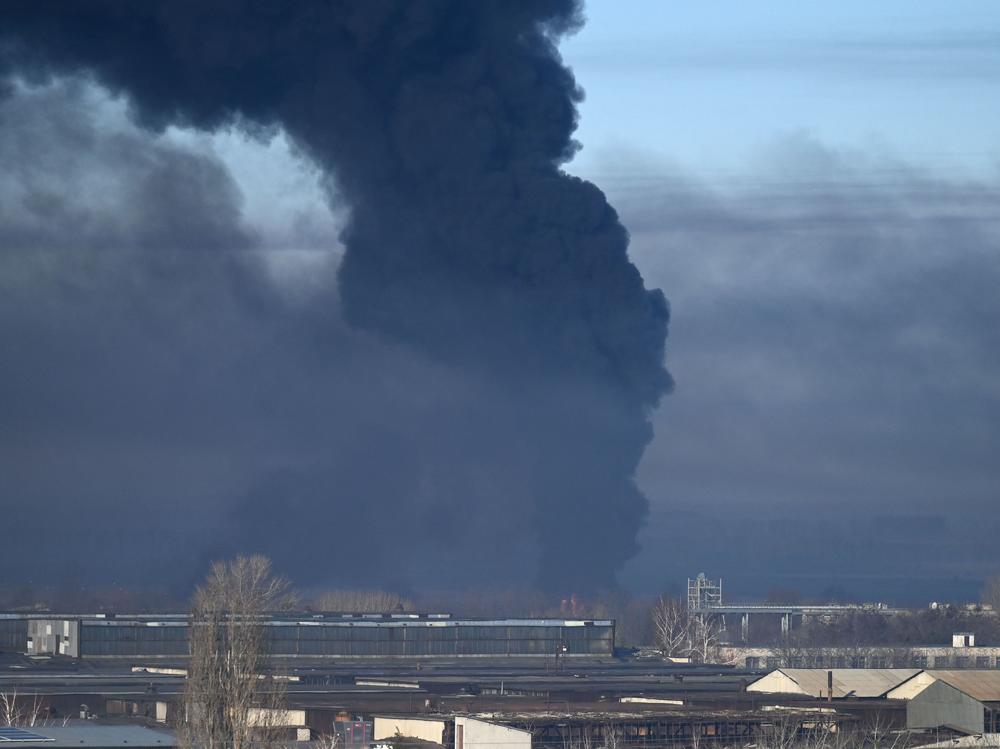Section Branding
Header Content
Russia is using controversial 'cluster munitions' in Ukraine, humanitarian groups say
Primary Content
Russian military forces have used cluster munitions — a highly controversial weapon banned by many countries — against at least two civilian targets during its invasion of Ukraine, according to two international humanitarian organizations.
Seven people died and 11 were injured in the bombings attributed to Russia, which has been known to use cluster munitions in warfare, possibly as recently as two years ago in Syria.
"Russian forces should stop using cluster munitions and end unlawful attacks with weapons that indiscriminately kill and maim," Steve Goose, arms director of Human Rights Watch, said in a statement.
Once fired, cluster munitions open in midair and rain down dozens or even hundreds of smaller submunitions, or "bomblets," over a large area the size of one or more football fields.
The munitions are notoriously difficult to control, striking nearby targets indiscriminately, which is why international human rights groups say they shouldn't be used anywhere near civilian populations, if at all.
A large portion of submunitions also fail to detonate on impact — as many as 40% by one estimate — leaving behind a trail of unexploded bombs that pose a secondary risk to people nearby.
In 2008, more than 100 countries agreed to a global treaty banning the use of cluster munitions, but neither Russia nor Ukraine signed on.
Cluster munitions hit a hospital and a preschool in Ukraine
According to Human Rights Watch, a Russian ballistic missile carrying cluster munitions struck outside a hospital in the city of Vuhledar, located in the Donetsk region of eastern Ukraine, on Thursday.
The group interviewed a doctor and a hospital official and examined photographs of the aftermath of the attack, which reportedly occurred around 10:30 a.m. local time.
Four civilians died and another 10 were injured, six of whom are health care workers. The hospital, an ambulance and other nearby vehicles sustained damage.
"I was on the first floor of our two-story building. I heard a loud explosion outside. We ran into the hallway. Luckily, we didn't have many patients," said Natalia Sosyura, the hospital's chief doctor, according to Human Rights Watch. "We all fell to the floor."
In a separate attack on Friday, cluster munitions fell on a preschool in the northeastern Ukrainian city of Okhtyrka in Sumy Oblast, Amnesty International reported. Three people, including a child, died. Another child was wounded.
Amnesty International said that Russian forces likely carried out the attack, since they were operating nearby and have a history of using cluster munitions, and that it may constitute a war crime.
"There is no possible justification for dropping cluster munitions in populated areas, let alone near a school," Agnès Callamard, secretary-general of Amnesty International, said in a statement.
"This attack bears all the hallmarks of Russia's use of this inherently indiscriminate and internationally-banned weapon, and shows flagrant disregard for civilian life," she added.
The group said drone footage showed four munitions striking the roof of the school and three more landing on the pavement outside.
Copyright 2022 NPR. To see more, visit https://www.npr.org.

